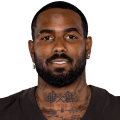On Target 🎯 No better time to buy low on Chris Godwin
I've been around the fantasy game for a while, and the target stat has come a long way, baby.
Targets didn't become a tracked stat until 1992. Pro Football Reference wasn't launched until 2003. My early days of fantasy football in the '90s involved scoring leagues by hand, sitting down in the morning with a pencil, a caffeinated beverage and the newspaper.
The pencil and newspaper are gone from my life now; the caffeine remains.
Receiving stats and analysis have blossomed in the modern era. Heck, this article a decade ago would have been merely about targets, full stop. Today, we have so many additional data points — first-read targets, average depth of target, catchable targets, routes run, red-zone data; the cup feels bottomless.
My goal every Tuesday this season is to analyze wide receiver data and trends, tracking where the puck has been and trying to figure out where the puck is headed. Targets will still factor in plenty, of course.
But remember: we have several different buckets to examine now.
The Best Tight End Life — Routes From The Slot
When it comes to tight end production, we like to find players who get used like wide receivers. We want our tight ends running routes, not taking out the trash (blocking).
With this in mind, the tight end slot rate column is useful to consider.
Mark Andrews is first in this stat, at 80.6%. The Ravens needed a little time to adjust to the Todd Monken offense, but it's ridiculous how awesome Baltimore looked in Sunday's blowout of a good Detroit team. Andrews is back to being Robin to Travis Kelce's Batman at the tight end position.

Jonnu Smith (61.2%) and Kyle Pitts (58.3%) are both top 10 in slot percentage among tight ends. Arthur Smith is going to drive us crazy one way or another, but at least he's been creative with his versatile tight ends. In a similar vein, the Patriots are both giving top-10 slot rates to both of their tight ends, Hunter Henry and Mike Gesicki. At least the Patriots offense looked like a professional unit in Week 7.
Surprisingly, Sam LaPorta is low on this list (27.4%), though his ability to block hasn't hurt his receiver production. Tyler Higbee is also outside of the top 40; I've discarded the 70-catch season I was expecting in August. I certainly didn't see Puka Nacua coming.
Dalton Kincaid has a 52% slot rate (tied for 14th) and his snap share is likely to spike with Dawson Knox out indefinitely. Kincaid caught all eight of his targets in the loss at New England.
Tight Ends and First-Read Targets
Slot work and regular routes are great, but we also want our tight ends to be a primary read. There are currently seven tight ends who draw a first-read target 20% of the time or greater (LaPorta just misses here, ranking eighth).
Travis Kelce, 28.7%
Darren Waller, 26.3%
T.J. Hockenson, 22.6%
Evan Engram, 22.5%
Mark Andrews, 21.8%
Dallas Goedert, 21.5%
Kyle Pitts, 20.0%
Notable laggers in this stat? George Kittle merely ranks 16th (15.4%), currently injured Pat Freiermuth is 18th and David Njoku is 20th. Dalton Kincaid ranks 23rd, but that number is sure to rise.
The Diontae Johnson List — Heavy-use Players Without a Touchdown
Evan Engram, 51 targets
Chris Godwin, 49 targets
DeAndre Hopkins, 47 targets
Elijah Moore, 43 targets
Josh Jacobs, 39 targets
Jerry Jeudy, 34 targets
Darius Slayton, 32 targets
Michael Gallup, 32 targets

Engram has never been a big touchdown guy. After a nifty six spikes in his rookie year, he has just 14 touchdowns in 74 games since — about one every six games. Obviously, there are several key Jaguars ahead of him on the team's pecking order.

Mike Evans has half of Tampa Bay's eight touchdowns. Godwin is the most plausible buy recommendation from this list, a simple case for positive regression. Godwin has nine red-zone targets, so there's been opportunity.

Hopkins has just three touchdowns in his last 15 games, in part because of mediocre quarterback play. And maybe that's going to get worse in Tennessee, with Ryan Tannehill out indefinitely (and unlikely for Week 8).

Maybe Moore and Amari Cooper are roughly equal in the Cleveland passing game, but does it matter? P.J. Walker doesn't have starter bona fides, and Deshaun Watson has not played well in his 10 Cleveland starts (6.4 YPA, 79.8 rating). It's a shame the team couldn't keep Jacoby Brissett.

Jacobs almost jumped off the list in Week 7, when he just missed landing his second foot on a short touchdown catch. Regardless, Jacobs has bigger problems at the moment, stuck on 347 rushing yards and a putrid 2.9 yards per carry.

Unless something goes horribly wrong in the next week, Jeudy is soon to be some other team's problem. You can take heart in his catch rate at a career-best 73.5%, but he's averaging a personal-low 11.4 yards per reception. He hasn't cracked the top 30 in half-point PPR finishes this year; his best showings are WR33, WR33, WR34.
It's worth noting that Zay Flowers (54 targets), Michael Thomas (54 targets) and Terry McLaurin (51 targets) are the busiest players with just one touchdown catch. Flowers and Thomas both have a reasonable nine red-zone targets.
Receiver Yards After Contact — Nico Collins' Emergence

The Collins breakout has a lot to do with career arc (it's his third season) and the snappy play of rookie C.J. Stroud. But Collins is making a lot of his own luck, averaging 4.4 yards after contact, the highest wideout number in the league among qualified players (Diontae Johnson is an eyelash higher but doesn't qualify with just two games). No other regular receiver is over 3.0 yards in this stat, though some interesting players are in the twos (Jake Bobo, Deebo Samuel, A.J. Brown, Garrett Wilson, George Pickens, Kendrick Bourne).
Data from Pro Football Reference and Fantasy Points was used in this article.
